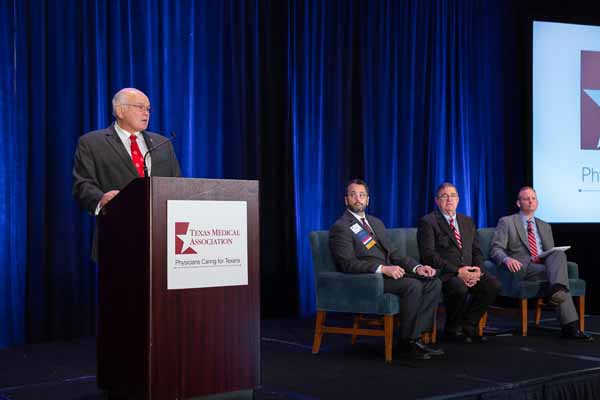
TMA President Doug Curran, MD, introduces panelists Jason Terk, MD, U.S. Rep. Michael Burgess, MD (R-Lewisville), and state Rep. Four Price (R-Amarillo) during Fall Conference. Photo: Matt Lemke PhotographyMedication-assisted treatment (MAT) is an expensive piece of the opioid solution, Texas lawmakers at the state and federal level explained at the Texas Medical Association’s 2018 Fall Conference on Saturday.
Jason Terk, MD, chair of TMA’s Council on Legislation, moderated a panel discussion on opioids that featured state Rep. Four Price (R-Amarillo) and U.S. Rep. Michael Burgess, MD (R-Lewisville), during the conference’s general session.
Representative Price, chair of the House Select Committee on Opioids & Substance Abuse, predicted the committee’s report, due by Nov. 1, will include recommendations “that will really result in meaningful legislation and move the needle forward.” Those may include recommendations on MAT and programs to address diversion of unused medication, he said. Coordinating the use of federal and state money is also necessary, he added.
Representative Price said prevention, education of physicians and patients, and use of the Centers for Disease Control and Prevention guidelines are some of the easiest pieces of the opioid solution.
“The harder thing is expanding MAT … and making that cost-effective for everybody across the state. It’s actually treating the hundreds of thousands of Texans that are already addicted; that’s a much more difficult thing to legislate and to pay for.”
Addressing the federal end of the issue, Representative Burgess said opioids would require a multi-factored approach. Congressional lawmakers this week finalized a bipartisan opioid measure, sending it to the president’s desk.
Representative Burgess said more federal money is available now than ever before to treat opioid disorders. On MAT, Dr. Burgess said he’s concerned by a recent expansion of independent prescriptive authority in other states. While Texas keeps nurse practitioners and physician assistants from practicing medicine, he said, “not every place in the country is as smart as Texas, and so there’s been a relaxing of the folks who are able to prescribe. And that does concern me.”
“You all know as much or better than I, these are sometimes difficult patients with multiple medical conditions, comorbidities, and mental health issues that sometimes are superimposed that make their management very, very difficult,” Dr. Burgess told his fellow physicians. “This is not an easy management, and yet, there did seem to be both in the committee and on the floor of the House, the notion that, ‘Well, if we just make more treatment available, things will get better.’ They could, but it also might not get better.”
Dr. Terk also asked Representative Price about the state’s upcoming opioid Prescription Monitoring Program (PMP) mandate. Starting Sept. 1, 2019, physicians will be required to check the state’s PMP before prescribing opioids, benzodiazepines, barbiturates, and carisoprodol. Physicians are apprehensive about that mandate, but Representative Price thinks the legislature will be flexible to a more gradual phase-in.
“I think there is a real desire to not just be restrictive with regard to what kind of process we want to have in place,” he said. “We do want to have a deadline that everybody feels like they can meet, but we want to do it in a way that makes sense, certainly.”
Dr. Terk laid out TMA’s current position on opioids, which includes supporting:
- More extensive pharmacy-based drug takeback programs to reduce inadvertent opioid diversion;
- More resources for expanding MAT and substance abuse treatment programs;
- Better coordination with mental health authorities; and
- Full integration of the state’s PMP with physicians’ electronic health records.